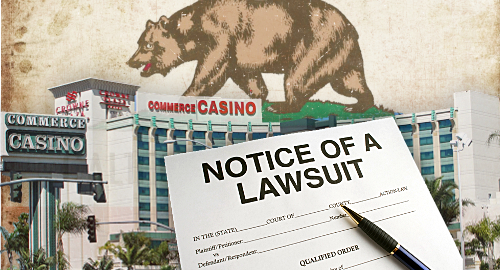 Two prominent California tribal casino operators are suing commercial card rooms over the latter’s use of ‘player-banked’ games that the tribes claim violate state gaming regulations.
Two prominent California tribal casino operators are suing commercial card rooms over the latter’s use of ‘player-banked’ games that the tribes claim violate state gaming regulations.
On Friday, the Times of San Diego reported that the Rincon Band of Luiseno Indians and the Santa Ynez Band of Chumash Indians had filed a lawsuit in San Diego Superior Court against cardroom operators, based on the tribes’ claim that these cardrooms are offering games that contravene state gaming regulations.
California card rooms are prohibited from offering so-called ‘house-banked’ games, such as blackjack, in which the players are betting against the house. But the card rooms have skirted this restriction through the use of ‘player-banked’ games, in which a player seated at the gaming table effectively serves as the house.
In 2016, the state’s Bureau of Gambling Control (BGC) upheld the card rooms’ ability to offer these games, provided the player-dealer position rotated to another member of the table every 60 minutes. But the BGC also allowed the same player-dealer to retain his role if the action at the table was paused for two minutes.
The state’s casino tribes have long protested this ‘potty break’ as upholding the letter of the regulations while demolishing the regulations’ intent. In May, Rincon Band chairman Bo Mazzetti said it was “time to quit messing around with these guys” and file a lawsuit already.
Last month, the BGC announced that it planned to “rescind game rules approvals for games too similar to 21/blackjack that are prohibited by state law.” But this was too little too late for California Nations Indian Gaming Association (CNIGA) chairman Steve Stalling, who called the announcement “a delaying tactic” and vowed that legal action was imminent.
Friday’s report quoted Mazetti saying the lawsuit was “not challenging the right of a business to operate, but rather the non-compliance with California law.” Mazetti added that the tribes’ patience with California regulators had worn thin, and the “lack of enforcement gives us no other option but to pursue legal remedies.”
The cardrooms targeted in the lawsuit include the Commerce Casino, Bicycle Casino, Hawaiian Gardens, properties operated by porn baron Larry Flynt, and multiple other venues. The suit also targets unnamed “third-party proposition players,” i.e. representatives of the private companies that serve as the ‘house’ in these banked games.
The lawsuit accuses these operators of unfair competition and being a public nuisance, while seeking injunctive relief to bar these venues from continuing to offer the prohibited games. The tribes are also seeking legal relief for financial losses by the tribes – in the form of gaming revenue and lost employment opportunities – and by the government in the form of tax revenue.
The historically fractious relationship between California’s tribal gaming operators and its commercial card rooms has contributed to the state’s inability to approve online poker legislation. This schism is expected to similarly impede the state’s capacity to approve sports betting legislation, although this hasn’t stopped prospective betting tie-ups between tribes and out-of-state commercial operators.